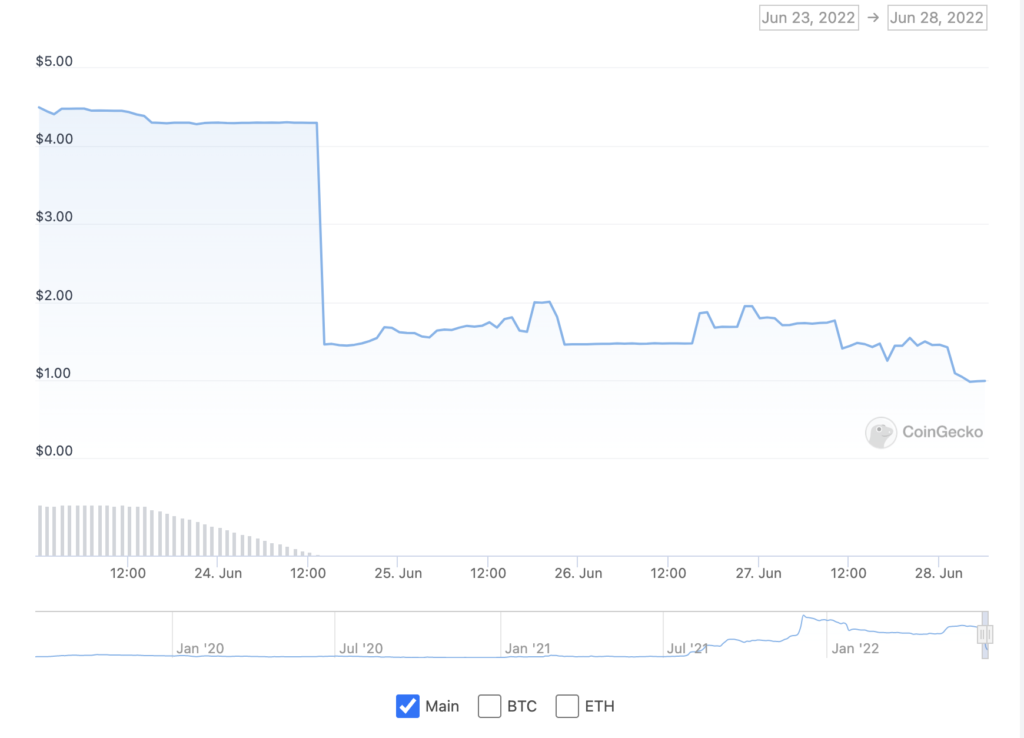In the past few months, ‘extreme market conditions’ has grown to become the most heard phrase in the crypto-assets ecosystem. Since the beginning of June, platforms including Celsius, Babel Finance, Voyager Digital, and Finblox have altered their mode of operations owing to the broader market drawdown.
In a ripple effect, On 23 June, Futures cryptocurrency exchange CoinFLEX paused its operations. In an announcement blog published by the company, Mark Lamb, the Exchange’s CEO stated,
“Due to extreme market conditions last week & continued uncertainty involving a counterparty, today we are announcing that we are pausing all withdrawals. We fully expect to resume withdrawals in a better position as soon as possible. We will fully communicate with you as we find out more.”
The exchange pegged its estimated time of recommencing withdrawal to 30 June. And, Mark Lamb reconfirmed this in a recent interview with Bloomberg.
Interestingly enough, on 27 June, the exchange published a recovery plan, “CoinFLEX’s Tokenization Solution to Resume Withdrawals and Normal Operations.” This would involve the launch of a new recovery token called Recovery Value USD (rvUSD).
Recovery Value USD
According to the announcement, the exchange ran into liquidity issues. This was due to the account of a ‘long-time customer of CoinFLEX’s that ran into negative equity.’ The company’s CEO also mentioned that under normal circumstances, the platform would automatically liquidate any such position.
However, in the case of this individual, there existed a “non-liquidation recourse account.” This prevented the account from being liquidated because of a pre-existing personal guarantee that the account owner had pledged.
Now, to resolve the issue, the exchange intended to monetize the already pledged personal guarantee. It would do this “by creating a corresponding liability in the form of a token called Recovery Value USD (“rvUSD”).”
According to the token’s Whitepaper, the rvUSD will be issued between 28 June and 1 July to non-American residents deemed to be ‘Sophisticated Investors.’
The whitepaper further described a ‘Sophisticated Investor’ as an individual with an annual income of at least $200,000, a net worth of $1 million. And, a person who meets the exchange’s KYC requirements. In addition, the minimum subscription per investor would be 100,000 USDC. The subscription would be at a 20% APR accrued and paid daily in USDC.
Plans of becoming more transparent?
The CEO expanded on his plans of recovery keeping the future in mind. He asserted that while the exchange has been discrete with its activities it plans to be more open in the future.
For example, the firm now intends to make the notional (USD) value of every account’s futures positions publicly available through an external auditing firm that will attest to these futures positions every hour. In the interview with Bloomberg, Lamb further elaborated,
“We need to do at least as good as, if not, much better than DeFi with respect to transparency.”
FLEX Coin in a bad shape?
As per data from CoinGecko, the price of FLEX Coin registered a 78% decline since the platform halted withdrawals. At press time, the token exchanged hands at $1.07 at a 38% loss in the last 24 hours.


